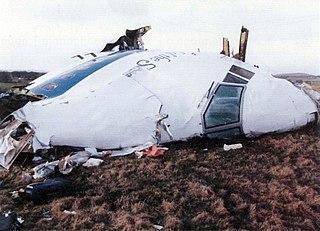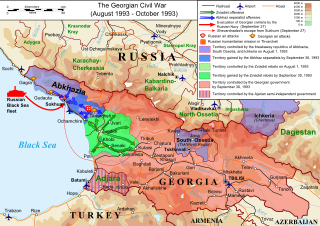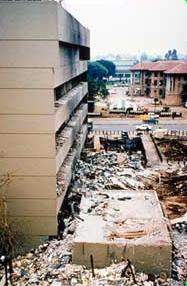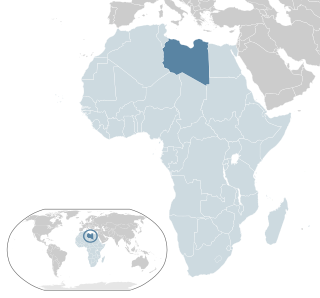
The foreign relations of Libya under Muammar Gaddafi (1969–2011) underwent much fluctuation and change. They were marked by severe tension with the West and by other national policies in the Middle East and Africa, including the Libyan government's financial and military support for numerous paramilitary and rebel groups.

UTA Flight 772 was a scheduled international passenger flight of the French airline Union de Transports Aériens (UTA) operating from Brazzaville in the People's Republic of the Congo, via N'Djamena in Chad, to Charles de Gaulle Airport in Paris, France, which crashed into the Ténéré desert near Bilma, Niger, on 19 September 1989 with the loss of all 170 people on board, after an in-flight explosion caused by a suitcase bomb. It is the deadliest aviation incident to occur in Niger.

Pan Am Flight 103 conspiracy theories suggest a number of possible explanations for the bombing of Pan Am Flight 103 on December 21, 1988. Some of the theories preceded the official investigation by Scottish police and the FBI; others arose from different interpretation of evidence presented at Libyan agent Abdelbaset al-Megrahi's 2000–2001 trial; yet others have been developed independently by individuals and organisations outside the official investigation.

United Nations Security Council Resolution 1564, adopted on 18 September 2004, after recalling resolutions 1502 (2003), 1547 (2004) and 1556 (2004), the Council threatened the imposition of sanctions against Sudan if it failed to comply with its obligations on Darfur, and an international inquiry was established to investigate violations of human rights in the region.

Pan Am Flight 103 (PA103/PAA103) was a regularly scheduled Pan Am transatlantic flight from Frankfurt to Detroit via a stopover in London and another in New York City. The transatlantic leg of the route was operated by Clipper Maid of the Seas, a Boeing 747 registered N739PA. Shortly after 19:00 on 21 December 1988, while the aircraft was in flight over the Scottish town of Lockerbie, it was destroyed by a bomb, killing all 243 passengers and 16 crew in what became known as the Lockerbie bombing. Large sections of the aircraft crashed in a residential street in Lockerbie, killing 11 residents. With a total of 270 fatalities, it is the deadliest terrorist attack in the history of the United Kingdom.

United Nations Security Council Resolution 1706, adopted on August 31, 2006, after recalling previous resolutions on the situation in Sudan, including resolutions 1556 (2004), 1564 (2005), 1574 (2004), 1590 (2004), 1591 (2005), 1593 (2004), 1663 (2006), 1665 (2006) and 1679 (2006), the Council expanded the mandate of the United Nations Mission in the Sudan (UNMIS) to include deployments in Darfur to enforce the Darfur Peace Agreement.

Hans Köchler's Lockerbie trial observer mission stemmed from the dispute between the United Kingdom, the United States, and Libya concerning arrangements for the trial of two Libyans accused of causing the explosion of Pan Am Flight 103 over Lockerbie on 21 December 1988.

Libya–United States relations are the bilateral relations between the State of Libya and the United States of America. Relations are today cordial and cooperative, with particularly strong security cooperation only after the 2012 attack on the US liaison office or mission in Benghazi. Furthermore, a Gallup poll conducted in March and April 2012 found that Libyans had "among the highest approval" of US leadership in the entire Middle East and North Africa region.

UN Security Council Resolution 748, adopted unanimously on 31 March 1992, after reaffirming Resolution 731 (1992), the UN Security Council decided, under Chapter VII of the United Nations Charter, that demanded Government of Libya's immediate compliance with requests from investigations relating to the destruction of Pan Am Flight 103 over Lockerbie and UTA Flight 772 over Chad and Niger, calling on Libya to cease all forms of terrorist action and assistance to terrorist groups. To this end, the council imposed sanctions on Libya until Libya complied.

United Nations Security Council resolution 876, adopted unanimously on 19 October 1993, after reaffirming resolutions 849 (1993), 854 (1993) and 858 (1993) concerning the Georgian–Abkhazian war, the council determined that the situation continued to constitute a threat to international peace and security.

UN Security Council Resolution 883, adopted on 11 November 1993, after reaffirming resolutions 731 (1992) and 748 (1992), the council noted that, twenty months later, Libya had not complied with previous Security Council resolutions and as a consequence imposed further international sanctions on the country.

United Nations Security Council resolution 910, adopted unanimously on 14 April 1994, after considering a letter by the UN Secretary-General Boutros Boutros-Ghali advising of his intention to send a reconnaissance team to the Aouzou Strip disputed between Chad and Libya, the Council decided to exempt the reconnaissance mission from a provision in Resolution 748 (1992) that imposed international sanctions on Libya.

United Nations Security Council resolution 915 was adopted unanimously on 4 May 1994. While reaffirming Resolution 910 (1994), the Council, acting on a recommendation by the UN Secretary-General Boutros Boutros-Ghali, established the United Nations Aouzou Strip Observer Group (UNASOG) to supervise the withdrawal of Libyan forces from the Aouzou Strip following an International Court of Justice opinion rendered in the Libya–Chad Territorial Dispute case that the strip formed part of the territory of Chad.

United Nations Security Council resolution 1044, adopted unanimously on 31 January 1996, after noting the assassination attempt on President of Egypt Hosni Mubarak at an Organisation of African Unity (OAU) summit in the Ethiopian capital Addis Ababa on 26 June 1995, demanded that the Government of Sudan comply with OAU requests to extradite suspects sheltered in the country to Ethiopia.

United Nations Security Council resolution 1189 was adopted unanimously on 13 August 1998. In the resolution, after expressing its deep disturbance at the bombings in Nairobi, Kenya, and Dar es Salaam, Tanzania, on 7 August 1998, the Council strongly condemned the terrorist attacks and called on countries to adopt measures to prevent further incidents.

UN Security Council Resolution 1192, adopted unanimously on 27 August 1998, after recalling resolutions 731 (1992), 748 (1992) and 883 (1993), the council welcomed an initiative to try two Libyan suspects accused of the bombing of Pan Am Flight 103 before a Scottish court in the Netherlands.
United Nations Security Council resolution 1269, adopted unanimously on 19 October 1999, after expressing concern at the increasing number of acts of international terrorism, the Council condemned terrorist attacks and called upon states to fully implement anti-terrorist conventions. It was the first time the Security Council had addressed terrorism in a general manner, though it did not define what constituted terrorism.

United Nations Security Council resolution 1455, adopted unanimously on 17 January 2003, after recalling resolutions 1267 (1999), 1333 (2000), 1363 (2001), 1373 (2001), 1390 (2001) and 1452 (2002) concerning Al-Qaeda, the Taliban and terrorism, the council improved the implementation of measures against the groups. It was the first Security Council resolution adopted in 2003.

United Nations Security Council resolution 1506, adopted on 12 September 2003, after recalling resolutions 731 (1992), 748 (1992), 883 (1993) and 1192 (1998) concerning the destruction of Pan Am Flight 103 over Lockerbie, Scotland in 1988 and UTA Flight 772 over Niger in 1989, the council lifted sanctions against Libya imposed after the country failed to co-operate with investigations into the destruction of the aircraft.

United Nations Security Council resolution 1556, adopted on 30 July 2004, after recalling resolutions 1502 (2003) and 1547 (2004) on the situation in Sudan, the council demanded that the Sudanese government disarm the Janjaweed militia and bring to justice those who had committed violations of human rights and international humanitarian law in Darfur.

















